The promoters sit along the wooden table – a witness to the learning and struggles of this community. On top of the table are the blue coolers containing the vaccines; all organized and marked with the name of each vaccine.
At the entrance to the room Gabi arranges a file divided into two parts. The first contains information sheets about each child who has been vaccinated and their previous illnesses. The second part of the file is a Community Diagnosis on all the children in the community, their families, previous illnesses, any cases of malnutrition and individual recommendations for treatment and prevention.
The diagnosis includes the most common illnesses in this community, such as respiratory problems related to sugar cane production. This work involves hours and hours of work breathing in thesmoke produced by the panela baking oven, where compañeros and their sons work from 2 o’clock in the morning, cutting and grinding the sugarcane, and boiling it down. The smoke in the kitchens, where women and children spend the majority of their days, is also a chronic problem. Despite efforts to build ecological ovens, the lack of resources and practical demonstration often limits successful implementation in the communities.
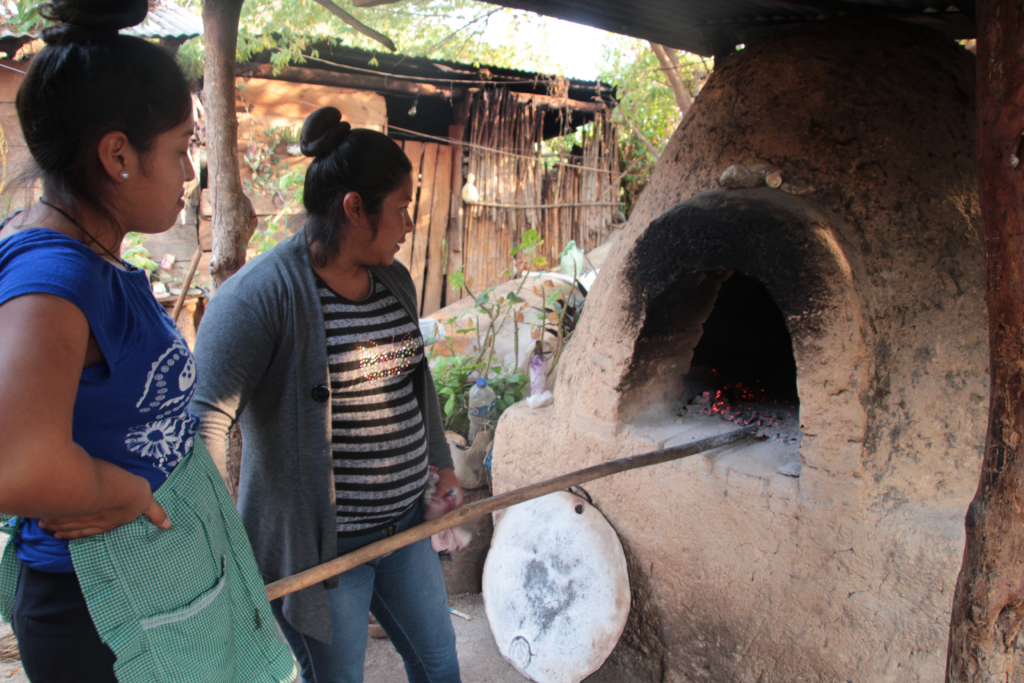
“So many things” thinks Gabi as she prepares the files. She thinks about another health concern in the diagnostic category the promoters jokingly call Coca-cola, and officially, diabetes – ” Even the Zapatistas don’t escape from this one, right?” – says Marcelino, the youngest promoter in the group.
Women’s Health
And then of course there is women’s health, which is the concern of the promotoras who are midwives. As women, they know that women’s health and bodies are both ignored and constantly manipulated by the patriarchy. Gabi knows the power of the internal work of the Zapatista compañeras, throughout Zapatista territory, who, individually and collectively, have worked hard to create a platform for more health rights, respect, recognition and equality. She, along with others, has participated in the work of the women’s commissions, in the many conversations and internal meetings. All of them, every single one here, feels proud of these advances.
Nevertheless, in spite of The Revolutionary Women’s Law, reproductive health is still not an easy topic to discuss. Just thinking about it gives Gabi a headache. She thinks about her aunts, sisters and closest companions, remembering the conversations about the body and health Stories and experiences sometimes told with anger, some of them anecdotes from the past, and others expressing ongoing fears. But at least we can have a conversation – she says to herself. It wasn’t possible before.
She is proud of the steps they have taken so far, but recognizes that only midwives and a few experienced health promoters have the trust of the women they serve. “We already work with the woman’s body and her maladies and needs,” says Claudia – one of the midwives in the group. “But you see? It’s not always easy, it’s hard for women to open up, to talk about ‘down there.’
Gabi knows that her patients only go to see a midwife for pregnancy care. She is proud that the Zapatista women, having learned the importance of pregnancy care, come for regular check-ups. The women take notes on how they feel, they pay attention to their nutrition, they know how to detect dangers in pregnancy, they do not allow violence towards them, they try to avoid strenuous work. All this they learned from their midwives and from the bi-monthly Health Campaigns organized by the Health Commissions. But women do not go to the midwife to take care of their own health. It is always putting the other, child or a partner, in front of herself.
And yes, it is the way we women understand the world – as caretakers of our families, of Mother Earth, of all that is Life. But in this struggle for life we forget ourselves, our own bodies. At times, Gabi despairs that women pay so little attention to their personal needs, that they continue to live in shame,that they discredit the importance of their own health. So often their choice to work in the struggle means sacrificing their body, putting it aside. Gabi understands this internal conflict.
She knows that they do not want to be “crybabies,” but she also knows that this is why it is necessary to organize. “Well, we cannot resist and fight for a better world if we do not start with ourselves, if we do not take care of our bodies and hearts.” Several promoters are already organizing small meetings and women’s groups to discuss reproductive health. It takes effort, economic resources and time, because each one of them is involved in different work commissions away from their homes.
Community Vaccination Clinics
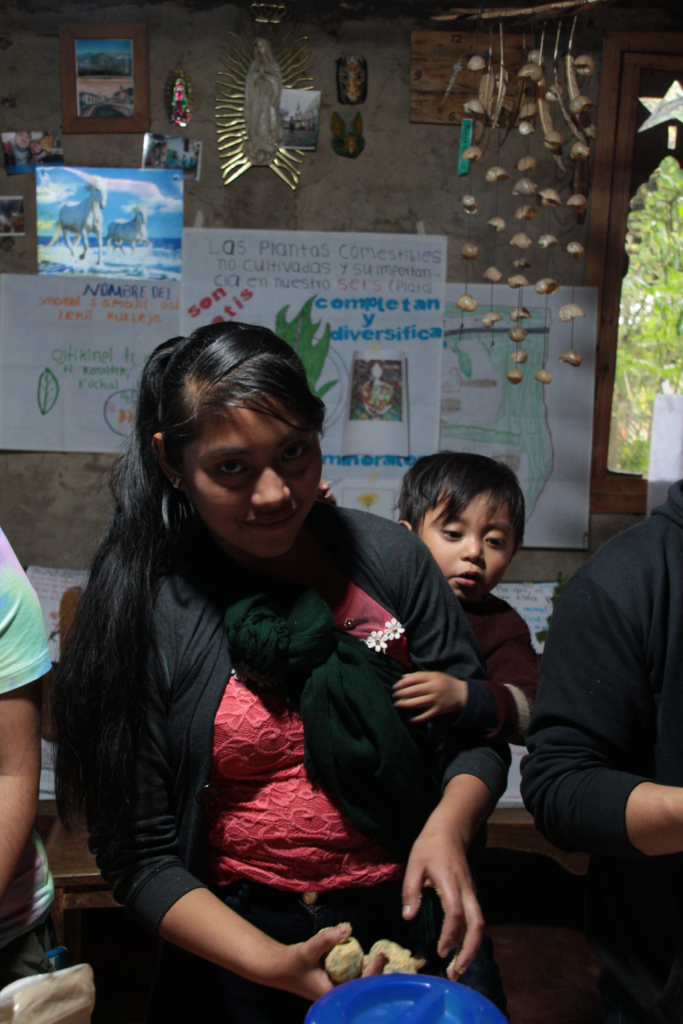
“Hey, compañera Adela Hernandez, where is your sheet?” [Gabi is so into her head she did not notice that in front of her Super File there are three women waiting to be attended. An older one with a face weathered by working in the sun and kitchen smoke, wore a skirt of faded flowers and her blouse half-open to breastfeed the little one she carries in her arms. “Ha compañera Adela, how wonderful to see your baby! The little one is already six months old, isn’t she, or is my memory failing me?” Gabi, smiling, asks the compañera whom she has known since she was little. The community herbalist, Adela is a knowledge bearer and Gabi has learned about plant medicine in workshops that Adela was giving to the health promoters in the caracol.
Adela was experienced in medicinal plants, their preparations and uses for different illnesses. Her knowledge came from her grandmother and so generation after generation they had the gift of working with nature, and asking permission to heal their compañeros. For Gabi it is an honor to be recognized by this wise woman who had shared such knowledge.
So now it is time to vaccinate the last of her four children and with three vaccines. One is the last dose against hepatitis B, another is for rotavirus and DTaP,- which is a set of three vaccines. It occurs to Gabi to call Barbara – the young promotora who struggled vaccinating young bebés in the previous community. She wants to make sure that Barbara is remembering which vaccines to give based on the child’s history and age, how each type of the vaccine needs to be given. But she doesn’t want to intimidate her.
A Community of Learning
Adela is a little uncomfortable thinking that it will be her little boy’s turn to be a guinea pig, but she is also aware of what she and thousands of health promoters have learned by practicing on one another, with patients, or sometimes pets. Here the medical school is real life, and in the communities people understand that in the Resistance you need patience and trust -to be open to the training of young people, not only to endure, but also to learn more respect for others, to have compassion for their fears and uncertainties, to apologize for their pain. Everyone here has felt the sting of the needle badly inserted in the arm, everyone here has caused these pains to others. No one complains, and those who cry are embraced and hugged.
Barbara responds well to Gabi’s questions about the child’s age and needs, and takes the opportunity to measure his weight and size, to assess his health and to evaluate the dosage needed. The child has good weight, skin color, tongue color, clear, bright eyes, and good breathing – all of this needs to be covered at once, taking advantage of the vaccination day. Barbara makes notes in the file with the family’s name. She is gaining more confidence in her abilities to do childrens’ health assessments.
Gabi asks Adela to gently but firmly hold the child in her arms, exposing his little arm outward. She asks Barbara to approach and carefully observe the upper arm. Explaining, and showing with her finger the shape of the muscle. Barbara observes Gabi’s hands repeating the movement with her own wrists. Adela encourages Barbara to inject the next shot in the other arm. She loses the fear she felt a short while ago ,won over by her affection for her new colleague. Her eyes show a desire to learn, to give of herself, and to let go of fear because what she can offer the community is greater.
Barbara smiles shyly looking up to Gabi for confirmation. No words are needed, Gabi’s loving gaze, her joyful smile at seeing the teammates building together is enough for Barbara. She measures the vaccine dose cautiously making sure it is correct for the child’s weight. She approaches the mother singing to the child in a soft, low voice. She holds her little arm, defines the injection site, cleans it, and as she stops singing, applies the vaccine very carefully. Adela and Gabi’s gazes cross with astonishment and joy. They both know that Barabara has her hand, acknowledging what she will need to support in this work.
They smile at each other, remembering the thousands of hours of workshops with solidarity groups of doctors who offered their service to this learning. The journey had taken years: discovering the human strength and fragility, practicing in their own homes and attending inter- regional meetings of knowledge shared, , both learning and unlearning. They both see the future of this girl in the paths they have traveled, and along new paths they have never experienced because the context today is different. “Well, here we are compañeras,” Adela says goodbye with an affectionate hug. Barbara hugs her spontaneously while jumping up and down – “Thank you, thank you, thank you compañera. Thank you Adolfo for not being afraid of me,” she says to the baby.
Adela looks at Gabi, “Well, you have a team to train, so get on with it. The time is now.” Gabi agrees, she knows that there is a need to organize workshops again because several promoters have recently joined the commission. There is a lot of enthusiasm and motivation from the health promoters, and it is necessary to organize, gather materials, plan workshops, and assign responsibility. Administering vaccines is the first step, one of the most basic, and from there the whole world of medicine, plants, medications…
Other promotores divided themselves into pairs of two, one reviewing the child’s immunization history and the other administering the vaccines.Patients range from 1 month to 6 years of age. The promoters meticulously review the information in their file, weigh and measure the children, inquire about their nutrition, general health, problems if any. They evaluate the community well-being in terms of preventive measures agreed upon by the community: Measures to prevent rodents and parasites, cleanliness and hygiene, cultivation of vegetables to diversify the diet.
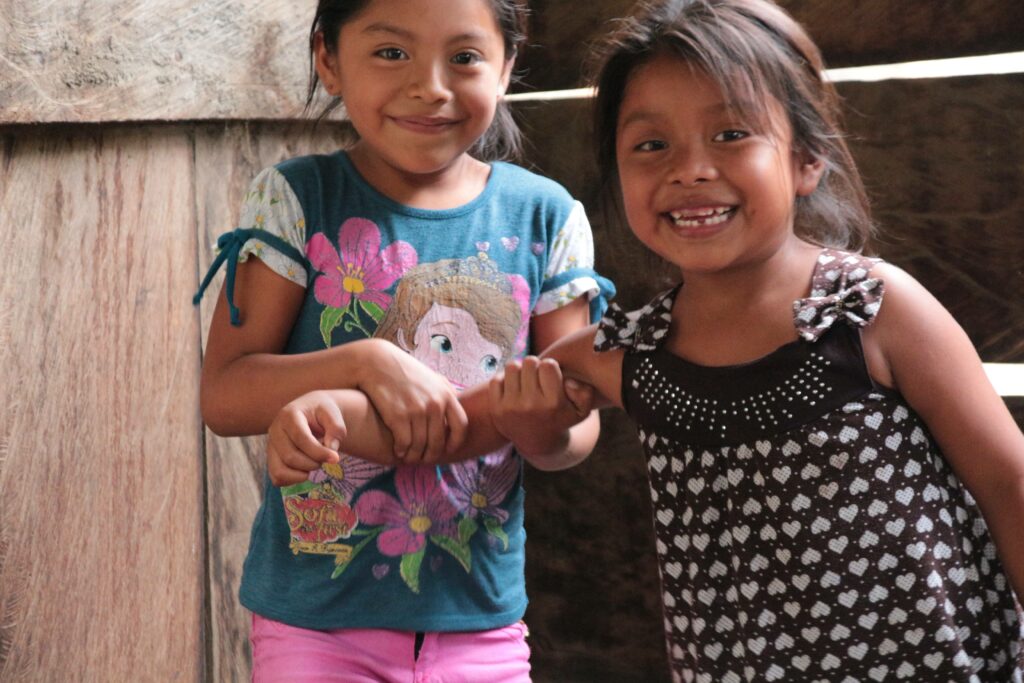
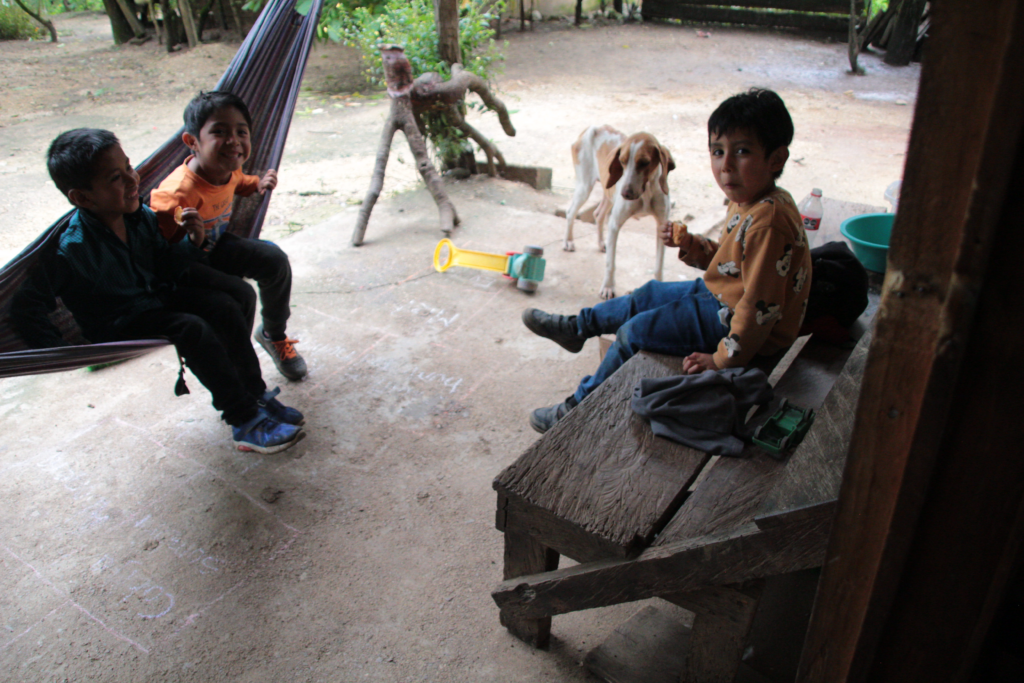
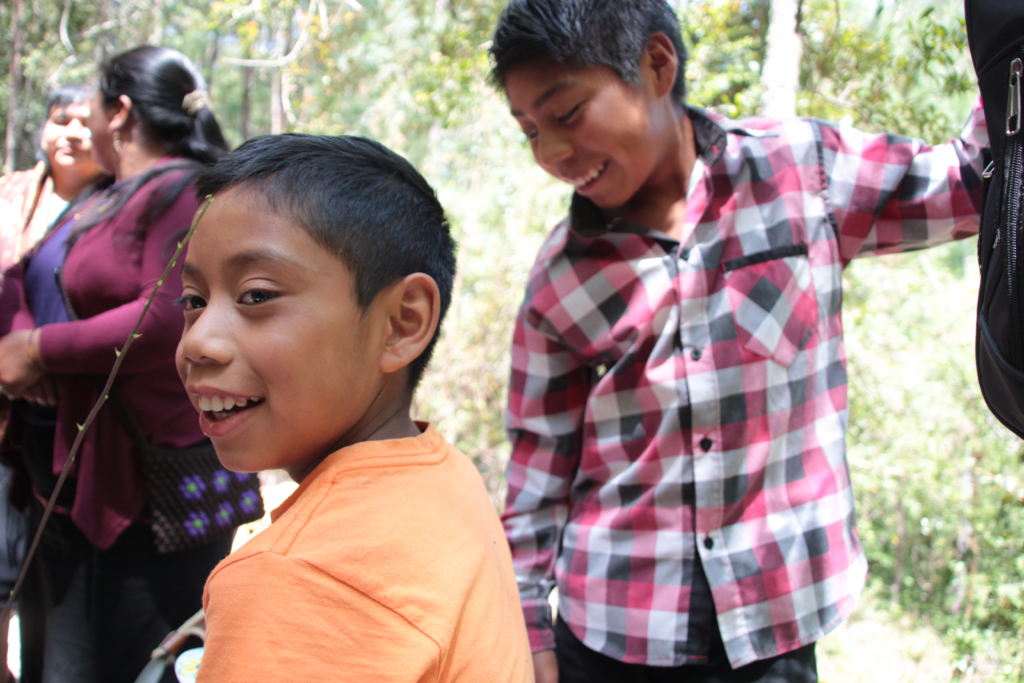
Autonomy, Slow but Steady
The well-being of each child, family and community is the well-being of the movement. Here, every child is a story, a family story, a life story. Each patient is an encounter. The stories flow from the latest gossip in the community to the work of the collectives, from a wedding to defense of the land to the criminal groups that pass through the region, from new crushes to the need for talks on women’s physical and mental health, from stories from the childhood under finqueros to discussion about women’s collectives in the region.
Gabi is happy with her work. Not only did they manage to vaccinate 56 children and attend to the health needs of the families that arrived, but also two young compañeras asked if they could join the health commission.
Marta, one of the young women, was saying “I was encouraged to enter and be part of this work because if we learn about health, about care, how to recognize diseases, and how to cure them, it is a good thing for us as a family, and as a community it gives us strength to resist. I want to help not only my community, but also other struggling communities because there are never any hands to spare. So I told my mom, I asked her, I asked her permission if they would let me, they said yes. And then there was a small assembly in the community to see if it was okay to do this work at my age. And in the end it was decided that I can, but you can talk about it between yourselves.”
Gabi thought for a moment. The decision had already been made by the community. She was glad to have a compañera from this community and another member of the health committee. She was right, there are never too many hands. She thought about the whole process involved in being a health promoter, the path of sacrifice, of sleepless nights, of walking at night, she thought about the workshops that at the beginning can be very difficult to understand, and with so much to memorize, the days of days of patient care without eating a single tortilla. “Welcome Marta to a very hard path but one of the deepest and most important to keep up the fight.” If you want , call the other compañera to come and have lunch with the health commission so we can get to know each other and see how much tortilla and chile one needs to survive in the struggle,” she responded with a laugh.
They found most of the promoters closing the coolers and files, ready for a taco, gossip, debriefing and to receive the new compañeras.
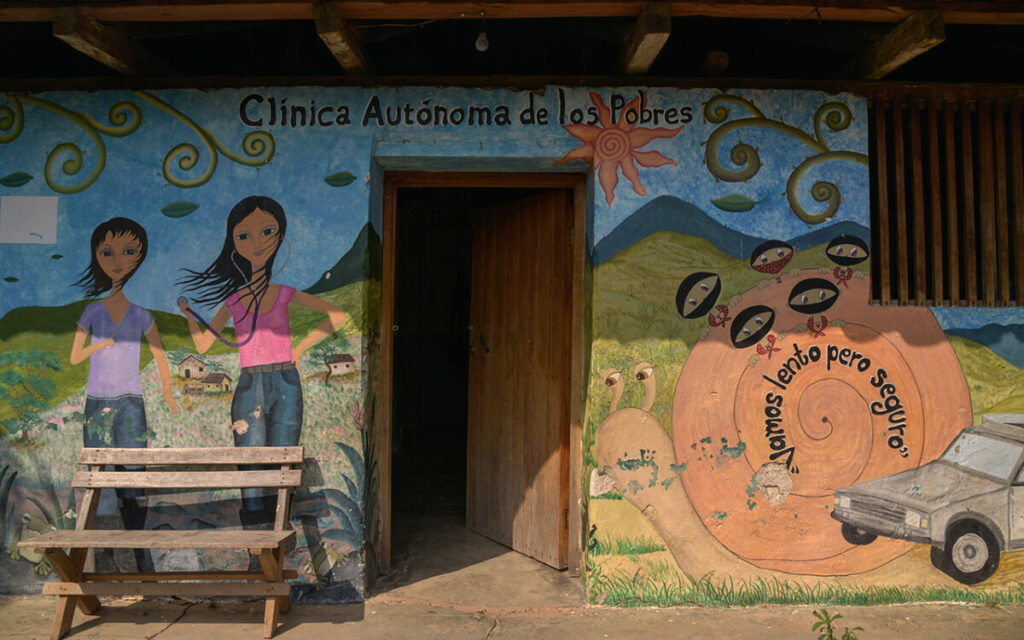
Communities in resistance are recuperating traditional medicine and also in constant training on new medical information. Our fund for Autonomous Health Clinics exclusively supports new training, materials, supplies and equipment for community “casas de salud” and regional health clinics. Thank you for your support!
